Oracle Database Administrator Resume Examples

Jul 18, 2024
|
12 min read
Crafting your Oracle database administrator resume: Unlock the secrets to job success and stand out in your field.
Rated by 348 people
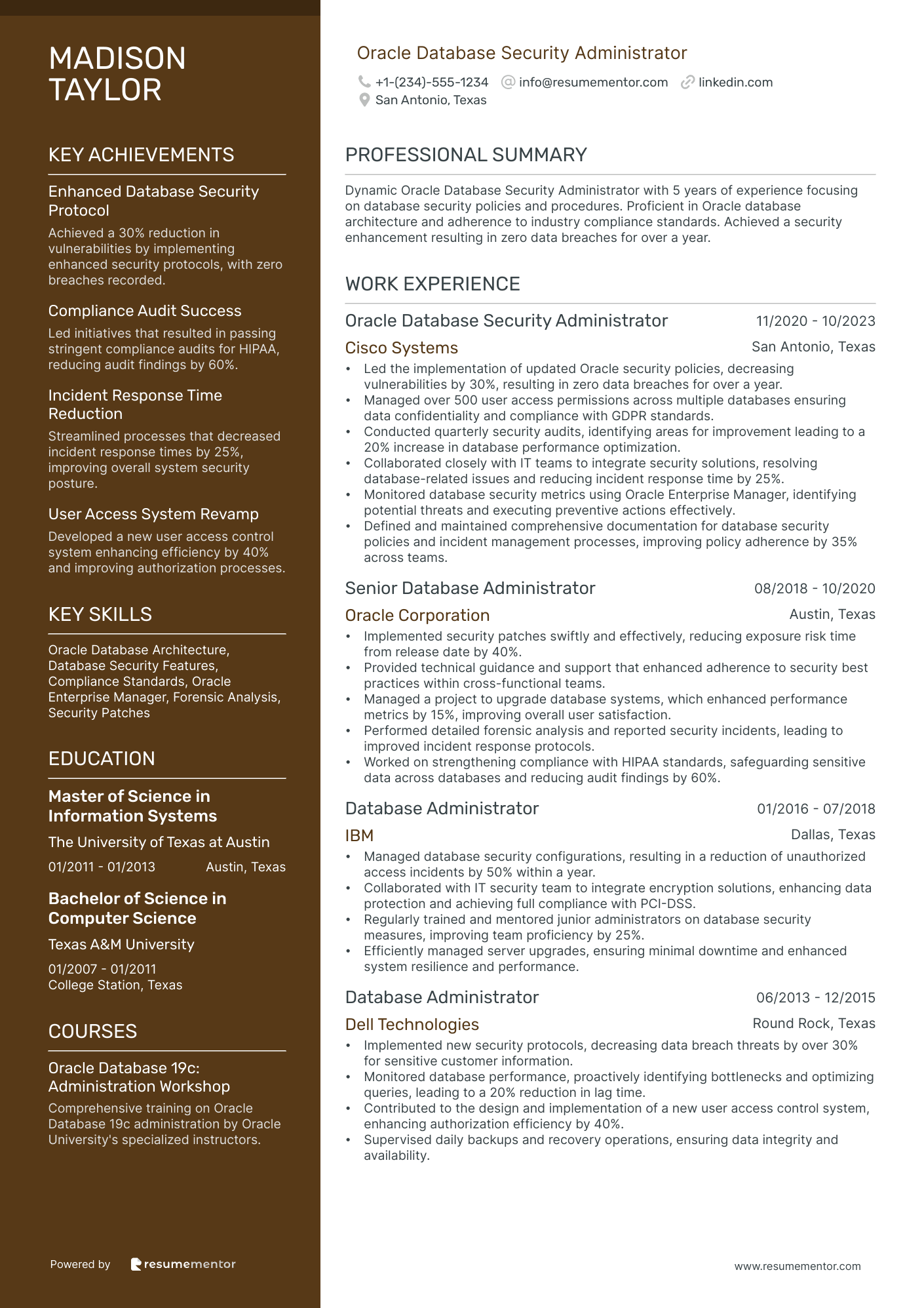
Oracle Database Security Administrator
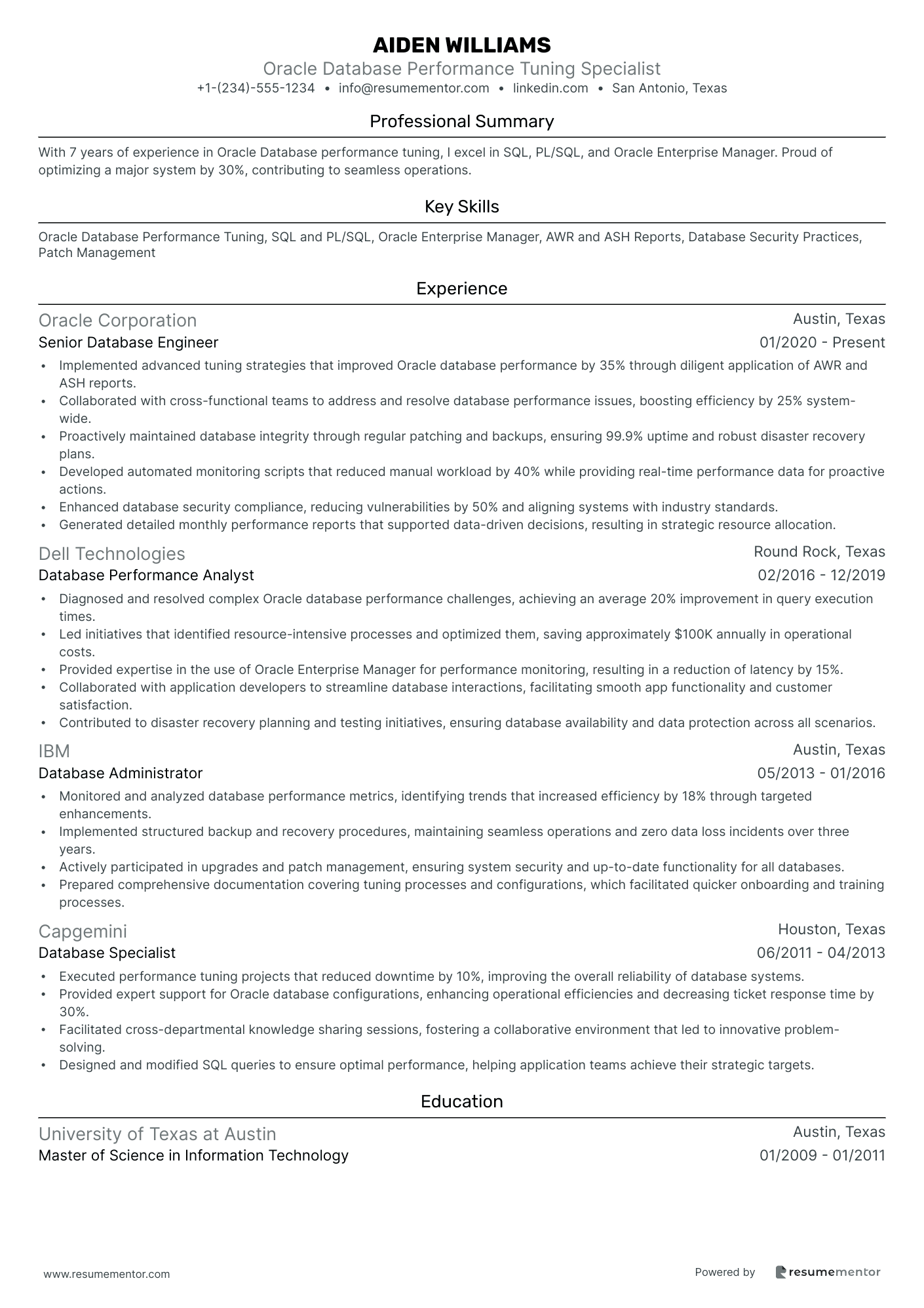
Oracle Database Performance Tuning Specialist
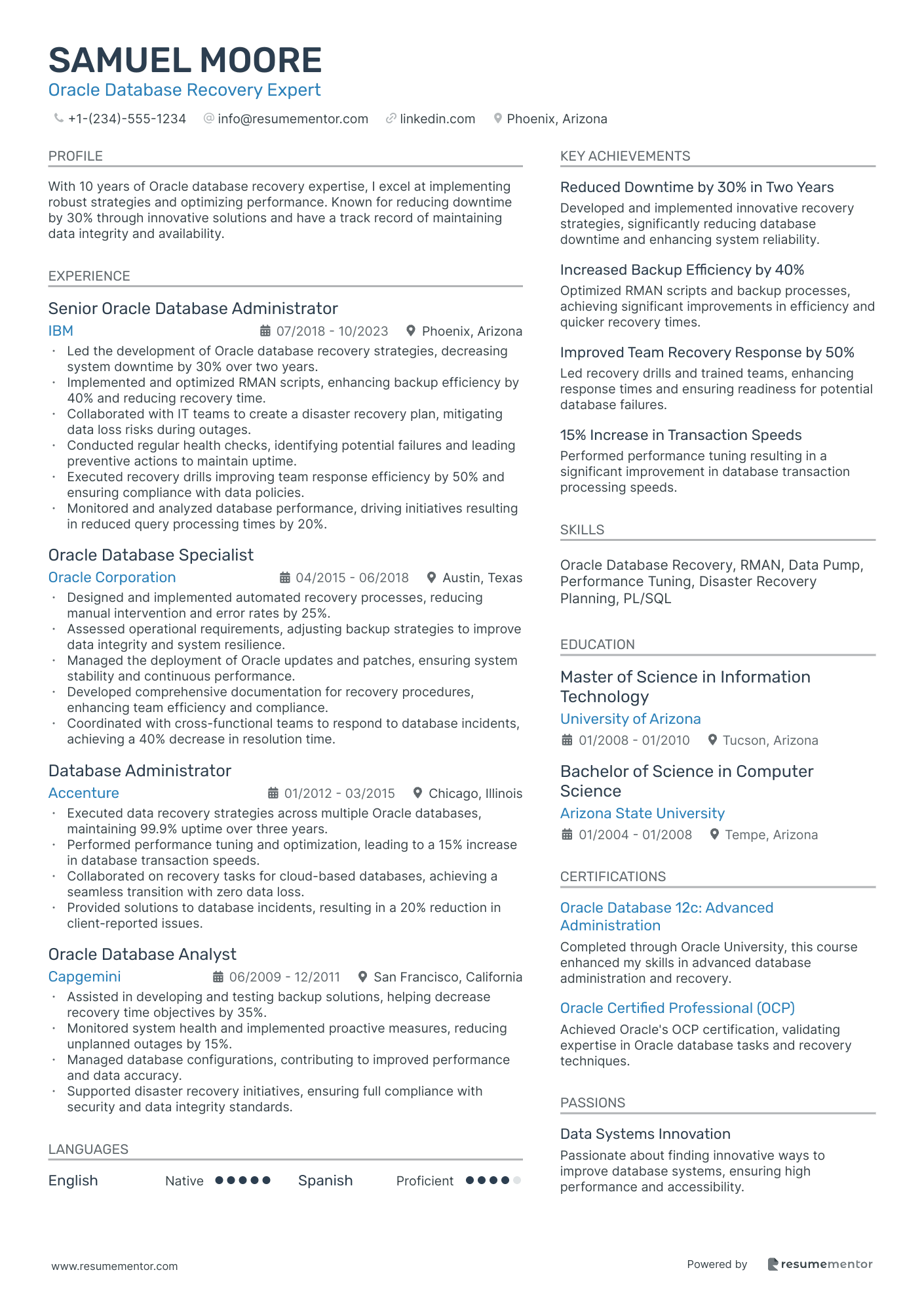
Oracle Database Recovery Expert

Senior Oracle Database Systems Administrator
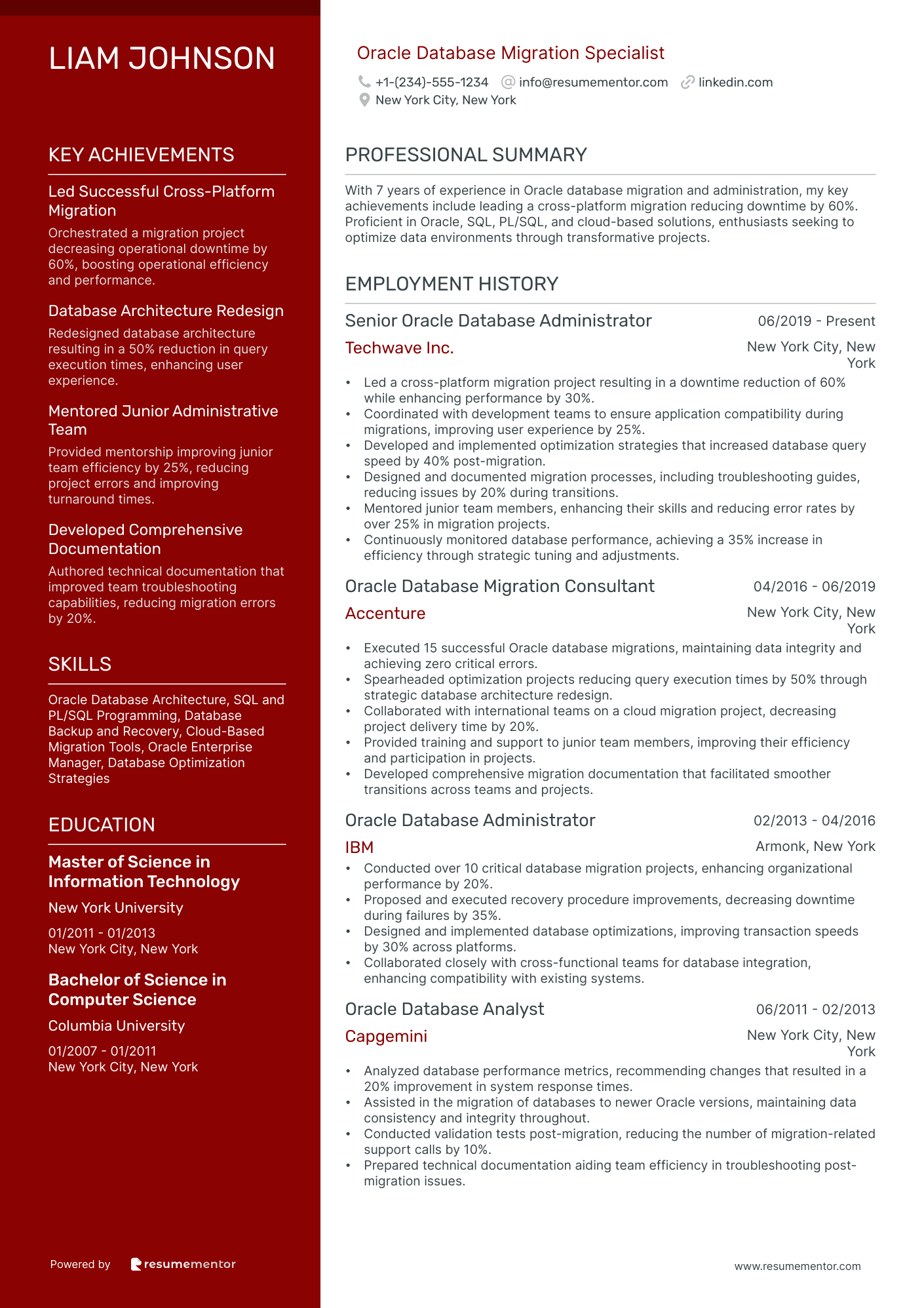
Oracle Database Migration Specialist
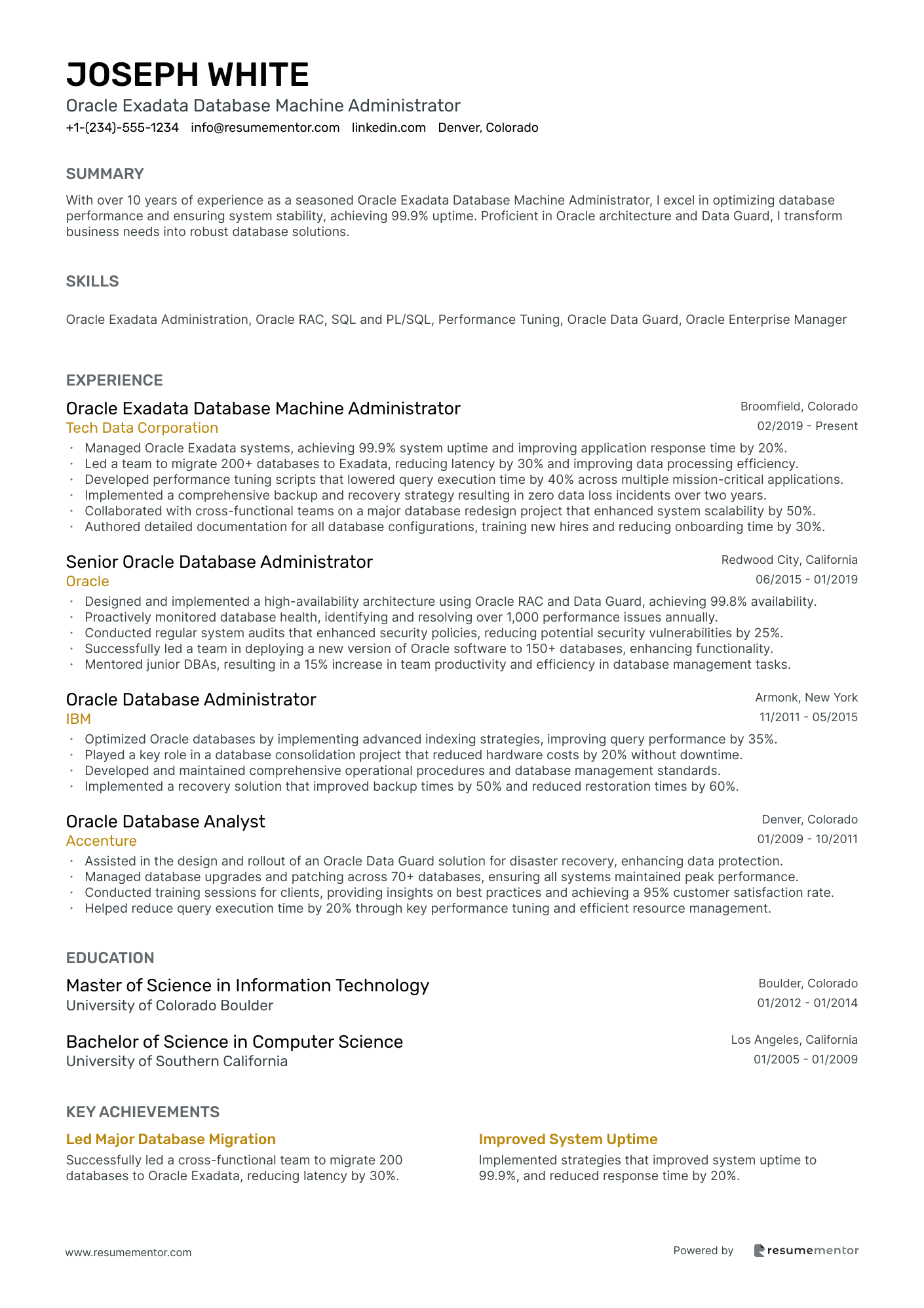
Oracle Exadata Database Machine Administrator
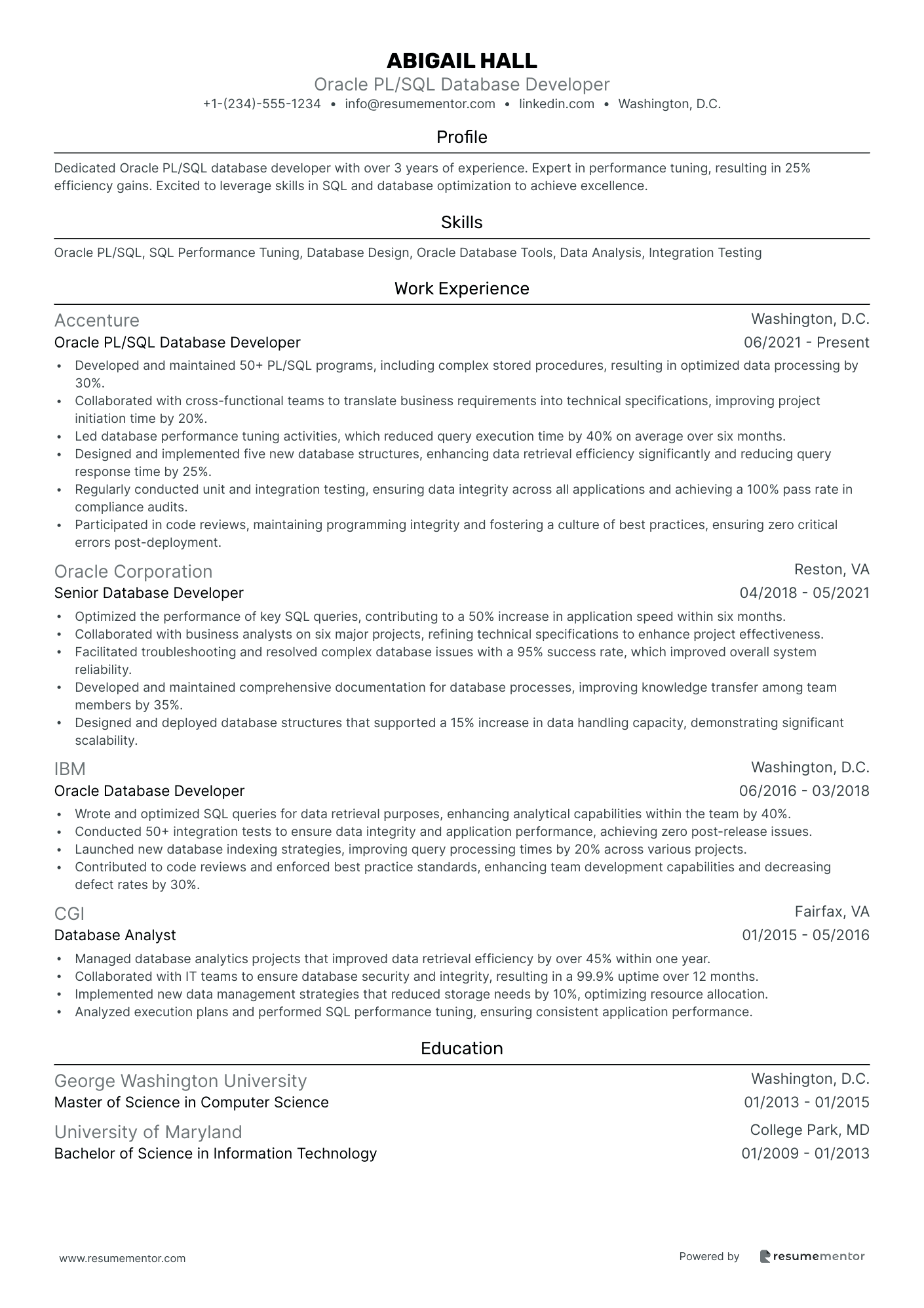
Oracle PL/SQL Database Developer
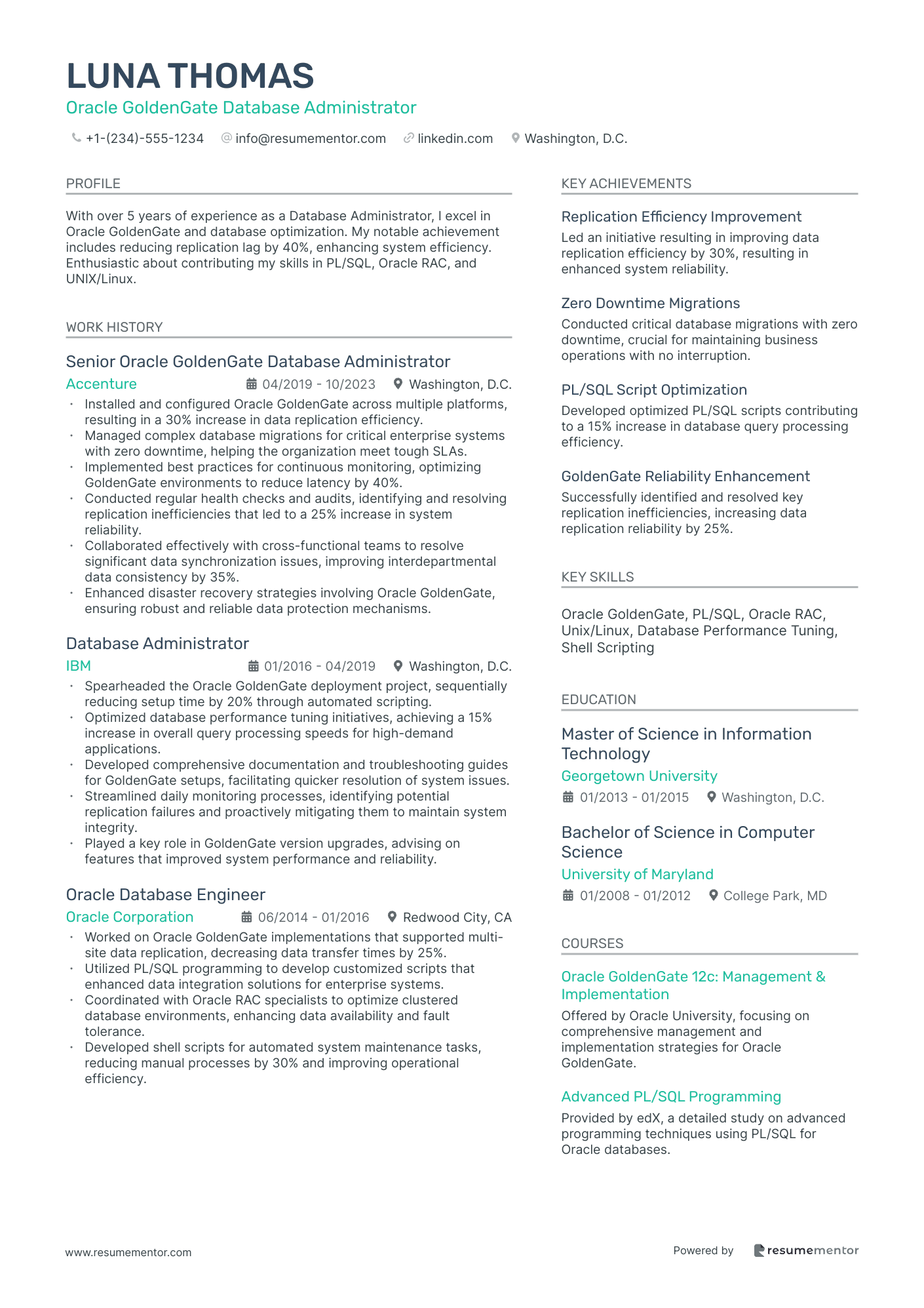
Oracle GoldenGate Database Administrator
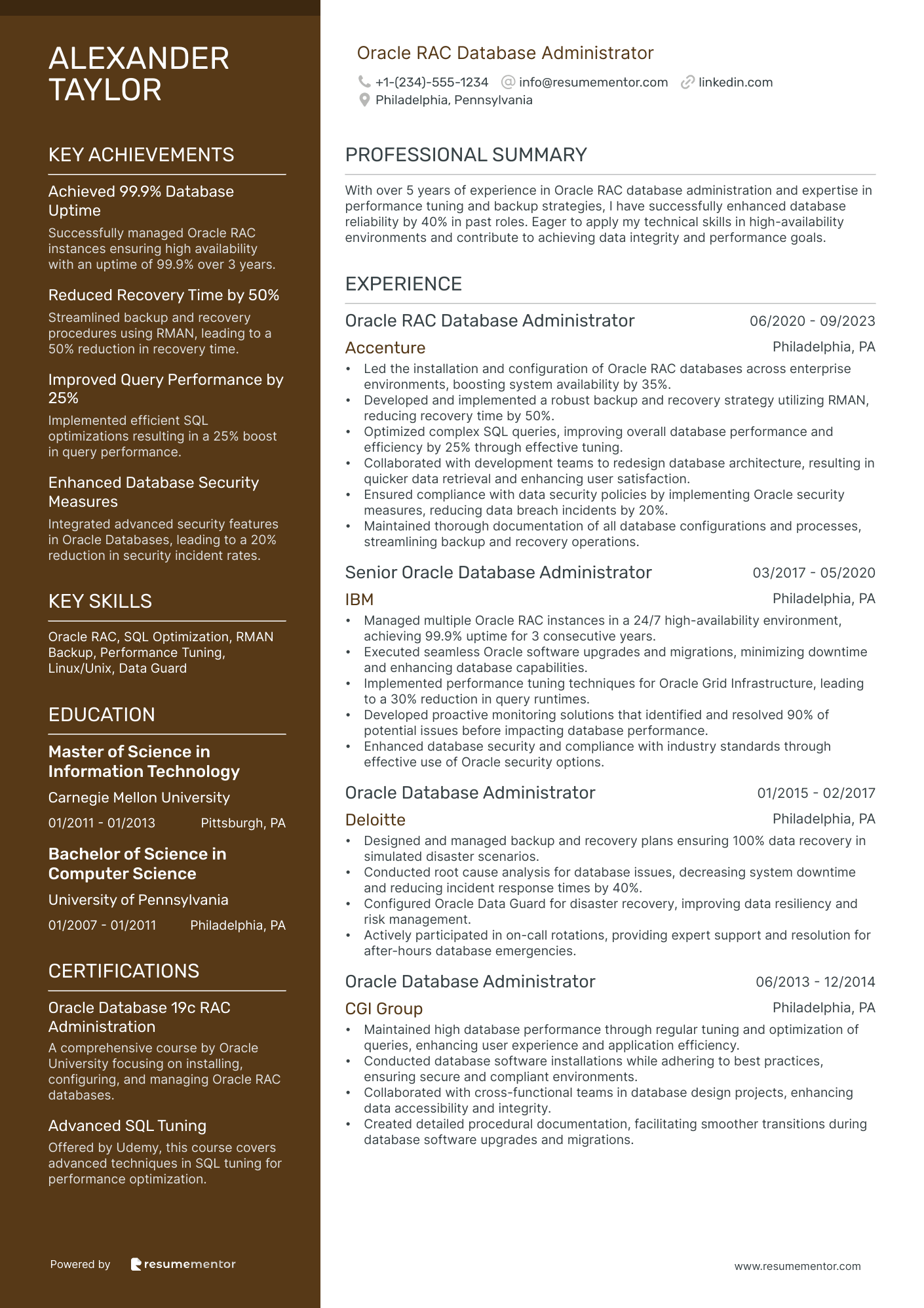
Oracle RAC Database Administrator
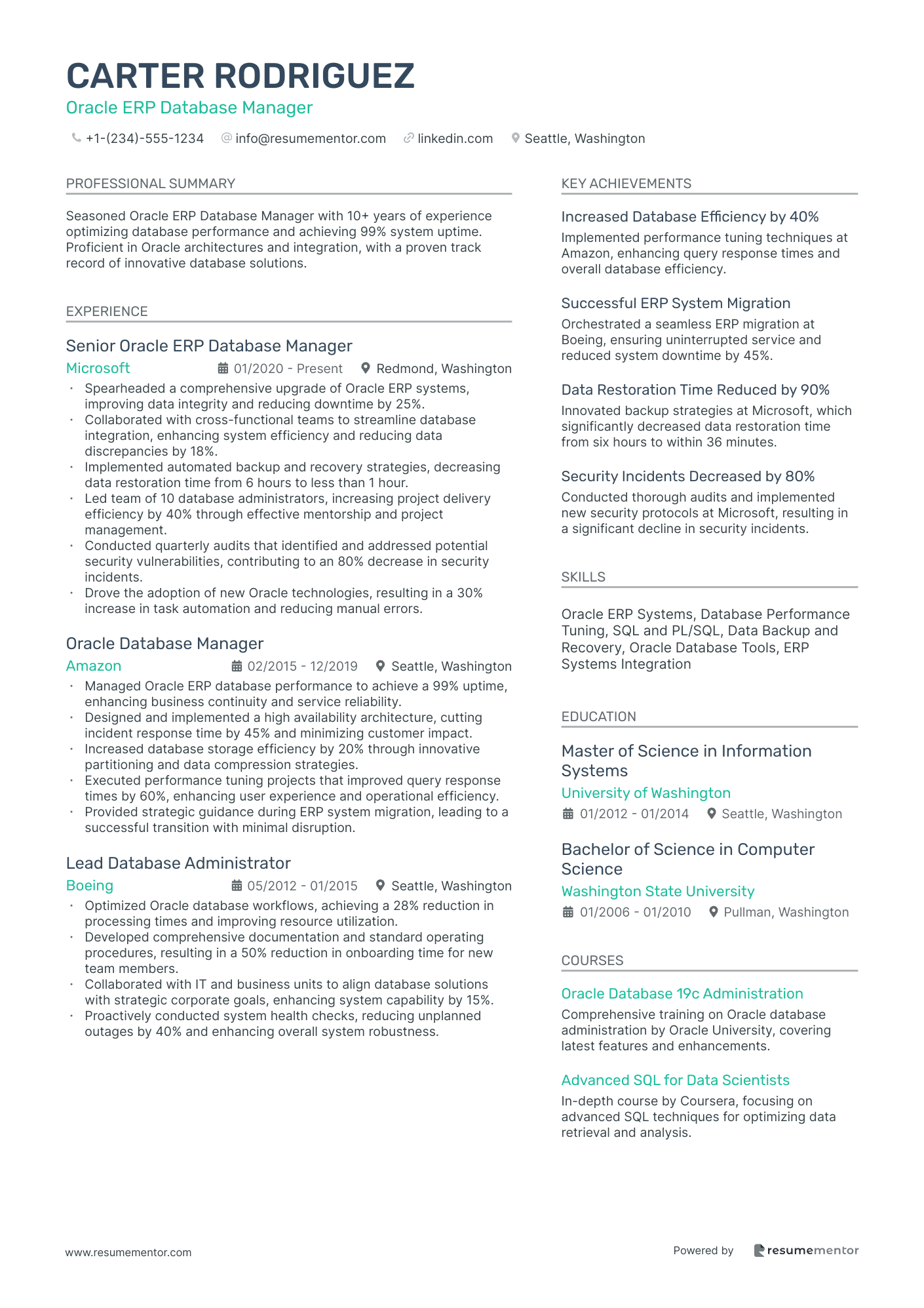
Oracle ERP Database Manager

Oracle Database Security Administrator resume sample
- •Led the implementation of updated Oracle security policies, decreasing vulnerabilities by 30%, resulting in zero data breaches for over a year.
- •Managed over 500 user access permissions across multiple databases ensuring data confidentiality and compliance with GDPR standards.
- •Conducted quarterly security audits, identifying areas for improvement leading to a 20% increase in database performance optimization.
- •Collaborated closely with IT teams to integrate security solutions, resolving database-related issues and reducing incident response time by 25%.
- •Monitored database security metrics using Oracle Enterprise Manager, identifying potential threats and executing preventive actions effectively.
- •Defined and maintained comprehensive documentation for database security policies and incident management processes, improving policy adherence by 35% across teams.
- •Implemented security patches swiftly and effectively, reducing exposure risk time from release date by 40%.
- •Provided technical guidance and support that enhanced adherence to security best practices within cross-functional teams.
- •Managed a project to upgrade database systems, which enhanced performance metrics by 15%, improving overall user satisfaction.
- •Performed detailed forensic analysis and reported security incidents, leading to improved incident response protocols.
- •Worked on strengthening compliance with HIPAA standards, safeguarding sensitive data across databases and reducing audit findings by 60%.
- •Managed database security configurations, resulting in a reduction of unauthorized access incidents by 50% within a year.
- •Collaborated with IT security team to integrate encryption solutions, enhancing data protection and achieving full compliance with PCI-DSS.
- •Regularly trained and mentored junior administrators on database security measures, improving team proficiency by 25%.
- •Efficiently managed server upgrades, ensuring minimal downtime and enhanced system resilience and performance.
- •Implemented new security protocols, decreasing data breach threats by over 30% for sensitive customer information.
- •Monitored database performance, proactively identifying bottlenecks and optimizing queries, leading to a 20% reduction in lag time.
- •Contributed to the design and implementation of a new user access control system, enhancing authorization efficiency by 40%.
- •Supervised daily backups and recovery operations, ensuring data integrity and availability.
Oracle Database Performance Tuning Specialist resume sample
- •Implemented advanced tuning strategies that improved Oracle database performance by 35% through diligent application of AWR and ASH reports.
- •Collaborated with cross-functional teams to address and resolve database performance issues, boosting efficiency by 25% system-wide.
- •Proactively maintained database integrity through regular patching and backups, ensuring 99.9% uptime and robust disaster recovery plans.
- •Developed automated monitoring scripts that reduced manual workload by 40% while providing real-time performance data for proactive actions.
- •Enhanced database security compliance, reducing vulnerabilities by 50% and aligning systems with industry standards.
- •Generated detailed monthly performance reports that supported data-driven decisions, resulting in strategic resource allocation.
- •Diagnosed and resolved complex Oracle database performance challenges, achieving an average 20% improvement in query execution times.
- •Led initiatives that identified resource-intensive processes and optimized them, saving approximately $100K annually in operational costs.
- •Provided expertise in the use of Oracle Enterprise Manager for performance monitoring, resulting in a reduction of latency by 15%.
- •Collaborated with application developers to streamline database interactions, facilitating smooth app functionality and customer satisfaction.
- •Contributed to disaster recovery planning and testing initiatives, ensuring database availability and data protection across all scenarios.
- •Monitored and analyzed database performance metrics, identifying trends that increased efficiency by 18% through targeted enhancements.
- •Implemented structured backup and recovery procedures, maintaining seamless operations and zero data loss incidents over three years.
- •Actively participated in upgrades and patch management, ensuring system security and up-to-date functionality for all databases.
- •Prepared comprehensive documentation covering tuning processes and configurations, which facilitated quicker onboarding and training processes.
- •Executed performance tuning projects that reduced downtime by 10%, improving the overall reliability of database systems.
- •Provided expert support for Oracle database configurations, enhancing operational efficiencies and decreasing ticket response time by 30%.
- •Facilitated cross-departmental knowledge sharing sessions, fostering a collaborative environment that led to innovative problem-solving.
- •Designed and modified SQL queries to ensure optimal performance, helping application teams achieve their strategic targets.
Oracle Database Recovery Expert resume sample
- •Led the development of Oracle database recovery strategies, decreasing system downtime by 30% over two years.
- •Implemented and optimized RMAN scripts, enhancing backup efficiency by 40% and reducing recovery time.
- •Collaborated with IT teams to create a disaster recovery plan, mitigating data loss risks during outages.
- •Conducted regular health checks, identifying potential failures and leading preventive actions to maintain uptime.
- •Executed recovery drills improving team response efficiency by 50% and ensuring compliance with data policies.
- •Monitored and analyzed database performance, driving initiatives resulting in reduced query processing times by 20%.
- •Designed and implemented automated recovery processes, reducing manual intervention and error rates by 25%.
- •Assessed operational requirements, adjusting backup strategies to improve data integrity and system resilience.
- •Managed the deployment of Oracle updates and patches, ensuring system stability and continuous performance.
- •Developed comprehensive documentation for recovery procedures, enhancing team efficiency and compliance.
- •Coordinated with cross-functional teams to respond to database incidents, achieving a 40% decrease in resolution time.
- •Executed data recovery strategies across multiple Oracle databases, maintaining 99.9% uptime over three years.
- •Performed performance tuning and optimization, leading to a 15% increase in database transaction speeds.
- •Collaborated on recovery tasks for cloud-based databases, achieving a seamless transition with zero data loss.
- •Provided solutions to database incidents, resulting in a 20% reduction in client-reported issues.
- •Assisted in developing and testing backup solutions, helping decrease recovery time objectives by 35%.
- •Monitored system health and implemented proactive measures, reducing unplanned outages by 15%.
- •Managed database configurations, contributing to improved performance and data accuracy.
- •Supported disaster recovery initiatives, ensuring full compliance with security and data integrity standards.
Senior Oracle Database Systems Administrator resume sample
- •Managed and optimized a portfolio of over 50 Oracle databases, reducing downtime by 25% through effective performance tuning.
- •Successfully executed three major database upgrades, impacting over 1,000 users and improving overall system efficiency by 35%.
- •Implemented disaster recovery solutions using Oracle Data Guard, resulting in a 50% faster recovery time.
- •Collaborated with cross-functional teams to deliver scalable database solutions for complex application rollouts, enhancing system reliability.
- •Developed and enforced database policies, ensuring a 95% adherence rate to industry best practices and regulatory standards.
- •Led a team of 5 DBAs, improving team efficiency by 30% through comprehensive training and mentorship.
- •Achieved a 40% increase in database performance by employing advanced tuning strategies and monitoring tools.
- •Devised automated scripts for routine database tasks, saving an estimated 20 hours of manual work per week.
- •Played a key role in capacity planning, ensuring a seamless support for business growth by scaling resources effectively.
- •Reduced data retrieval time by 25% for major applications through targeted optimizations.
- •Maintained detailed database documentation and architecture diagrams, improving system understanding for new staff.
- •Ensured database availability of over 99% through rigorous monitoring and proactive maintenance routines.
- •Conducted root cause analysis for critical incidents, minimizing recurrence by implementing corrective actions.
- •Enhanced data security and compliance, leading to a 20% improvement in audit performances.
- •Partnered with application developers to migrate databases with minimal downtime, streamlining operations.
- •Assisted in the migration of databases to Oracle 12c, improving user experience across systems.
- •Executed routine backups and managed disaster recovery plans, ensuring optimal data protection.
- •Optimized SQL queries and scripts, enhancing database performance by 15% across several applications.
- •Contributed to team knowledge base, sharing insights from various successful performance interventions.
Oracle Database Migration Specialist resume sample
- •Led a cross-platform migration project resulting in a downtime reduction of 60% while enhancing performance by 30%.
- •Coordinated with development teams to ensure application compatibility during migrations, improving user experience by 25%.
- •Developed and implemented optimization strategies that increased database query speed by 40% post-migration.
- •Designed and documented migration processes, including troubleshooting guides, reducing issues by 20% during transitions.
- •Mentored junior team members, enhancing their skills and reducing error rates by over 25% in migration projects.
- •Continuously monitored database performance, achieving a 35% increase in efficiency through strategic tuning and adjustments.
- •Executed 15 successful Oracle database migrations, maintaining data integrity and achieving zero critical errors.
- •Spearheaded optimization projects reducing query execution times by 50% through strategic database architecture redesign.
- •Collaborated with international teams on a cloud migration project, decreasing project delivery time by 20%.
- •Provided training and support to junior team members, improving their efficiency and participation in projects.
- •Developed comprehensive migration documentation that facilitated smoother transitions across teams and projects.
- •Conducted over 10 critical database migration projects, enhancing organizational performance by 20%.
- •Proposed and executed recovery procedure improvements, decreasing downtime during failures by 35%.
- •Designed and implemented database optimizations, improving transaction speeds by 30% across platforms.
- •Collaborated closely with cross-functional teams for database integration, enhancing compatibility with existing systems.
- •Analyzed database performance metrics, recommending changes that resulted in a 20% improvement in system response times.
- •Assisted in the migration of databases to newer Oracle versions, maintaining data consistency and integrity throughout.
- •Conducted validation tests post-migration, reducing the number of migration-related support calls by 10%.
- •Prepared technical documentation aiding team efficiency in troubleshooting post-migration issues.
Oracle Exadata Database Machine Administrator resume sample
- •Managed Oracle Exadata systems, achieving 99.9% system uptime and improving application response time by 20%.
- •Led a team to migrate 200+ databases to Exadata, reducing latency by 30% and improving data processing efficiency.
- •Developed performance tuning scripts that lowered query execution time by 40% across multiple mission-critical applications.
- •Implemented a comprehensive backup and recovery strategy resulting in zero data loss incidents over two years.
- •Collaborated with cross-functional teams on a major database redesign project that enhanced system scalability by 50%.
- •Authored detailed documentation for all database configurations, training new hires and reducing onboarding time by 30%.
- •Designed and implemented a high-availability architecture using Oracle RAC and Data Guard, achieving 99.8% availability.
- •Proactively monitored database health, identifying and resolving over 1,000 performance issues annually.
- •Conducted regular system audits that enhanced security policies, reducing potential security vulnerabilities by 25%.
- •Successfully led a team in deploying a new version of Oracle software to 150+ databases, enhancing functionality.
- •Mentored junior DBAs, resulting in a 15% increase in team productivity and efficiency in database management tasks.
- •Optimized Oracle databases by implementing advanced indexing strategies, improving query performance by 35%.
- •Played a key role in a database consolidation project that reduced hardware costs by 20% without downtime.
- •Developed and maintained comprehensive operational procedures and database management standards.
- •Implemented a recovery solution that improved backup times by 50% and reduced restoration times by 60%.
- •Assisted in the design and rollout of an Oracle Data Guard solution for disaster recovery, enhancing data protection.
- •Managed database upgrades and patching across 70+ databases, ensuring all systems maintained peak performance.
- •Conducted training sessions for clients, providing insights on best practices and achieving a 95% customer satisfaction rate.
- •Helped reduce query execution time by 20% through key performance tuning and efficient resource management.
Oracle PL/SQL Database Developer resume sample
- •Developed and maintained 50+ PL/SQL programs, including complex stored procedures, resulting in optimized data processing by 30%.
- •Collaborated with cross-functional teams to translate business requirements into technical specifications, improving project initiation time by 20%.
- •Led database performance tuning activities, which reduced query execution time by 40% on average over six months.
- •Designed and implemented five new database structures, enhancing data retrieval efficiency significantly and reducing query response time by 25%.
- •Regularly conducted unit and integration testing, ensuring data integrity across all applications and achieving a 100% pass rate in compliance audits.
- •Participated in code reviews, maintaining programming integrity and fostering a culture of best practices, ensuring zero critical errors post-deployment.
- •Optimized the performance of key SQL queries, contributing to a 50% increase in application speed within six months.
- •Collaborated with business analysts on six major projects, refining technical specifications to enhance project effectiveness.
- •Facilitated troubleshooting and resolved complex database issues with a 95% success rate, which improved overall system reliability.
- •Developed and maintained comprehensive documentation for database processes, improving knowledge transfer among team members by 35%.
- •Designed and deployed database structures that supported a 15% increase in data handling capacity, demonstrating significant scalability.
- •Wrote and optimized SQL queries for data retrieval purposes, enhancing analytical capabilities within the team by 40%.
- •Conducted 50+ integration tests to ensure data integrity and application performance, achieving zero post-release issues.
- •Launched new database indexing strategies, improving query processing times by 20% across various projects.
- •Contributed to code reviews and enforced best practice standards, enhancing team development capabilities and decreasing defect rates by 30%.
- •Managed database analytics projects that improved data retrieval efficiency by over 45% within one year.
- •Collaborated with IT teams to ensure database security and integrity, resulting in a 99.9% uptime over 12 months.
- •Implemented new data management strategies that reduced storage needs by 10%, optimizing resource allocation.
- •Analyzed execution plans and performed SQL performance tuning, ensuring consistent application performance.
Oracle GoldenGate Database Administrator resume sample
- •Installed and configured Oracle GoldenGate across multiple platforms, resulting in a 30% increase in data replication efficiency.
- •Managed complex database migrations for critical enterprise systems with zero downtime, helping the organization meet tough SLAs.
- •Implemented best practices for continuous monitoring, optimizing GoldenGate environments to reduce latency by 40%.
- •Conducted regular health checks and audits, identifying and resolving replication inefficiencies that led to a 25% increase in system reliability.
- •Collaborated effectively with cross-functional teams to resolve significant data synchronization issues, improving interdepartmental data consistency by 35%.
- •Enhanced disaster recovery strategies involving Oracle GoldenGate, ensuring robust and reliable data protection mechanisms.
- •Spearheaded the Oracle GoldenGate deployment project, sequentially reducing setup time by 20% through automated scripting.
- •Optimized database performance tuning initiatives, achieving a 15% increase in overall query processing speeds for high-demand applications.
- •Developed comprehensive documentation and troubleshooting guides for GoldenGate setups, facilitating quicker resolution of system issues.
- •Streamlined daily monitoring processes, identifying potential replication failures and proactively mitigating them to maintain system integrity.
- •Played a key role in GoldenGate version upgrades, advising on features that improved system performance and reliability.
- •Worked on Oracle GoldenGate implementations that supported multi-site data replication, decreasing data transfer times by 25%.
- •Utilized PL/SQL programming to develop customized scripts that enhanced data integration solutions for enterprise systems.
- •Coordinated with Oracle RAC specialists to optimize clustered database environments, enhancing data availability and fault tolerance.
- •Developed shell scripts for automated system maintenance tasks, reducing manual processes by 30% and improving operational efficiency.
- •Monitored Oracle database environments across diverse platforms, ensuring high availability and seamless data processing.
- •Analyzed system performance metrics, implementing solutions that improved database response times by 20%.
- •Assisted in disaster recovery planning and execution, safeguarding critical data against potential threats effectively.
- •Integrated diverse data replication tools, enhancing system resilience and allowing for scalable data solutions.
Oracle RAC Database Administrator resume sample
- •Led the installation and configuration of Oracle RAC databases across enterprise environments, boosting system availability by 35%.
- •Developed and implemented a robust backup and recovery strategy utilizing RMAN, reducing recovery time by 50%.
- •Optimized complex SQL queries, improving overall database performance and efficiency by 25% through effective tuning.
- •Collaborated with development teams to redesign database architecture, resulting in quicker data retrieval and enhancing user satisfaction.
- •Ensured compliance with data security policies by implementing Oracle security measures, reducing data breach incidents by 20%.
- •Maintained thorough documentation of all database configurations and processes, streamlining backup and recovery operations.
- •Managed multiple Oracle RAC instances in a 24/7 high-availability environment, achieving 99.9% uptime for 3 consecutive years.
- •Executed seamless Oracle software upgrades and migrations, minimizing downtime and enhancing database capabilities.
- •Implemented performance tuning techniques for Oracle Grid Infrastructure, leading to a 30% reduction in query runtimes.
- •Developed proactive monitoring solutions that identified and resolved 90% of potential issues before impacting database performance.
- •Enhanced database security and compliance with industry standards through effective use of Oracle security options.
- •Designed and managed backup and recovery plans ensuring 100% data recovery in simulated disaster scenarios.
- •Conducted root cause analysis for database issues, decreasing system downtime and reducing incident response times by 40%.
- •Configured Oracle Data Guard for disaster recovery, improving data resiliency and risk management.
- •Actively participated in on-call rotations, providing expert support and resolution for after-hours database emergencies.
- •Maintained high database performance through regular tuning and optimization of queries, enhancing user experience and application efficiency.
- •Conducted database software installations while adhering to best practices, ensuring secure and compliant environments.
- •Collaborated with cross-functional teams in database design projects, enhancing data accessibility and integrity.
- •Created detailed procedural documentation, facilitating smoother transitions during database software upgrades and migrations.
Oracle ERP Database Manager resume sample
- •Spearheaded a comprehensive upgrade of Oracle ERP systems, improving data integrity and reducing downtime by 25%.
- •Collaborated with cross-functional teams to streamline database integration, enhancing system efficiency and reducing data discrepancies by 18%.
- •Implemented automated backup and recovery strategies, decreasing data restoration time from 6 hours to less than 1 hour.
- •Led team of 10 database administrators, increasing project delivery efficiency by 40% through effective mentorship and project management.
- •Conducted quarterly audits that identified and addressed potential security vulnerabilities, contributing to an 80% decrease in security incidents.
- •Drove the adoption of new Oracle technologies, resulting in a 30% increase in task automation and reducing manual errors.
- •Managed Oracle ERP database performance to achieve a 99% uptime, enhancing business continuity and service reliability.
- •Designed and implemented a high availability architecture, cutting incident response time by 45% and minimizing customer impact.
- •Increased database storage efficiency by 20% through innovative partitioning and data compression strategies.
- •Executed performance tuning projects that improved query response times by 60%, enhancing user experience and operational efficiency.
- •Provided strategic guidance during ERP system migration, leading to a successful transition with minimal disruption.
- •Optimized Oracle database workflows, achieving a 28% reduction in processing times and improving resource utilization.
- •Developed comprehensive documentation and standard operating procedures, resulting in a 50% reduction in onboarding time for new team members.
- •Collaborated with IT and business units to align database solutions with strategic corporate goals, enhancing system capability by 15%.
- •Proactively conducted system health checks, reducing unplanned outages by 40% and enhancing overall system robustness.
- •Administered Oracle ERP systems, ensuring 98% uptime and enabling seamless business operations across multiple departments.
- •Initiated data integrity projects, achieving a 99.9% accuracy rate which greatly supported business reporting and decision-making processes.
- •Participated in database security improvements, reducing risk score by 25% through enhanced encryption protocols.
- •Contributed to the deployment of a new ERP module, enabling 15% growth in transaction processing capabilities over a 6-month period.
As an Oracle database administrator, you hold the keys to vast kingdoms of data, ensuring everything runs smoothly and remains secure. When it's time to find a new job, your technical expertise needs a strong presence on your resume. Crafting an impressive resume can feel like unraveling a complex query, but it's all about turning your specialized skills into words that catch an employer's eye.
In today's competitive job market, the organization of your resume is as important as the organization of data in a database. A clear and structured resume highlights your skills and achievements, ensuring they remain as accessible and efficient as a well-maintained system. Using professional resume templates can give you the framework you need to present your information effectively.
With the rapidly changing landscape of database administration, employers are looking for professionals who can seamlessly adapt to new challenges. To stand out, highlight your problem-solving skills and your ability to optimize databases, which are vital in your field.
This guide will help you refine your resume to showcase your strengths. By the end, your resume will not just detail your career history, but also narrate your journey as an Oracle database administrator in a compelling way.
Key Takeaways
- Crafting a resume for an Oracle Database Administrator position involves showcasing both your technical skills and career progression, with an emphasis on clear structure and using professional templates as a framework.
- Key sections to focus on include contact information, a professional summary, technical skills, work experience, education and certifications, and projects, each highlighting your ability to ensure database security, performance, and accessibility.
- It's important to use a reverse chronological format for your experience section, employing action verbs and quantifiable metrics to demonstrate achievements like performance improvements or successful migrations.
- Your skills section should highlight both hard skills, such as SQL tuning and database security, and soft skills like communication and problem-solving, integrated throughout the resume to enhance visibility.
- Including extra sections like language skills, hobbies, volunteer work, and relevant books read helps provide potential employers with a comprehensive view of your professional and personal background.
What to focus on when writing your oracle database administrator resume
Your Oracle Database Administrator resume should masterfully convey your skills and experience in Oracle database management, showcasing your capability to ensure database security, performance, and accessibility—qualities that make you an asset to any organization relying on Oracle systems.
How to structure your oracle database administrator resume
- Contact Information: Ensure all your contact details, such as your name, phone number, email, and LinkedIn profile, are up-to-date and professional. This section serves as the entry point for recruiters to reach out to you, making first impressions count.
- Professional Summary: This is your chance to make a strong initial impact. Craft a brief statement that delivers a snapshot of your experience, highlighting years spent in database management, your core skills, and your most significant achievements. This overview sets the tone for the detailed information that follows.
- Technical Skills: Offer a deep dive into your technical arsenal. List your expertise with Oracle-specific tools and technologies like Oracle Database Architecture, PL/SQL, RMAN, and Oracle Grid Control. Your proficiency with tools like Oracle Enterprise Manager should be apparent here, as it emphasizes your hands-on capability to optimize database functionality.
- Work Experience: Detail your career journey with a focus on the roles where you honed your skills as an Oracle DBA. Use bullet points to clarify your responsibilities and the impact of your work, such as improvements in database performance or efficiency gains, using quantifiable metrics to underscore your achievements.
- Education and Certifications: Highlight your academic background and any professional certifications that underscore your expertise. Degrees related to computer science and certifications like Oracle Certified Professional (OCP) add credibility and weight to your resume, suggesting a robust theoretical foundation paired with practical skills.
- Projects: Elaborate on the standout projects that demonstrate your problem-solving skills and technical expertise. Include specific examples of database migrations, performance tuning, or system upgrades that highlight your ability to deliver results in complex scenarios.
Each section outlines a crucial part of your story as an Oracle Database Administrator, setting you up for success by showcasing your skills and achievements in a clear, impactful way. Up next, we'll delve into the resume format to ensure each section effectively conveys your professional narrative.
Which resume format to choose
Crafting a resume as an Oracle Database Administrator involves more than just listing your experience; it’s about presenting your skills and career journey in a way that resonates with your industry. Begin with a clean, professional design that not only highlights your technical abilities but also reflects your career progression. Opting for a reverse chronological format can emphasize your most recent roles and achievements, making it easy for hiring managers to see your advancements and increasing responsibilities in Oracle database management.
Selecting the right font can also enhance the presentation of your resume. Modern fonts like Raleway, Montserrat, or Lato are excellent choices because they provide a contemporary look without sacrificing readability. These fonts can give your resume a polished appearance that aligns with the tech-savvy nature of database administration, demonstrating your awareness of both detail and style.
Saving your resume as a PDF is essential for maintaining the integrity of your design and format. The PDF format ensures that what you see on your screen is exactly what hiring managers will see, regardless of the device or software they use. This consistency is crucial in making a professional impression and ensures that your carefully crafted resume doesn't lose its layout coherence during the review process.
Attention to detail extends to setting your margins as well. A one-inch margin on all sides creates a balanced and uncluttered look. This layout not only aids readability but also subtly showcases your organizational skills, which are highly valued in the role of an Oracle Database Administrator. Proper margins ensure your content has room to breathe, making it easier for employers to focus on your qualifications and experience.
By keeping these elements in mind, you can create a resume that effectively highlights your expertise and draws the attention of recruiters in the competitive field of database administration.
How to write a quantifiable resume experience section
To craft an exceptional experience section for your Oracle Database Administrator resume, ensure your achievements and impacts are front and center. Begin with your most recent position and work backward, covering around 10-15 years or as relevance dictates. Tailoring this section to the job description is crucial — emphasize skills and accomplishments that match what the employer is looking for. Use vibrant, action-oriented verbs like "optimized," "implemented," and "achieved" to convey your contributions. Highlight quantifiable achievements to clearly demonstrate your successes. Here's an example in JSON format:
- •Boosted database performance by 40% through effective SQL query and index optimization.
- •Led a team of 5 DBAs in migrating 50+ databases to Oracle 19c, slashing downtime by 70%.
- •Implemented security measures that cut unauthorized access incidents by 90%.
- •Created an automated monitoring system, reducing incident response time by 50%.
This section is effective because it seamlessly combines your role's responsibilities with compelling results. It presents a picture of ongoing excellence where each achievement builds on your core skills as an Oracle Database Administrator. By integrating action verbs, the description of your duties feels dynamic, and it aligns perfectly with what employers desire. Linking technical expertise with leadership in real-life scenarios positions you as a candidate with depth, demonstrating both immediate impact and forward-thinking improvements.
Efficiency-Focused resume experience section
An efficiency-focused Oracle Database Administrator resume experience section should clearly demonstrate your impact on performance and resource management. Begin by noting the timeframe you held each role and be specific with your job title, such as "Senior Oracle DBA," to clearly reflect your expertise. Include the name of your workplace and provide a brief description of the company if it helps bring context to your role.
To effectively convey your achievements, ensure each bullet point highlights a specific accomplishment or contribution. Use action verbs and quantitative data to show improvements you've made or issues you've resolved. For instance, you could discuss how you significantly reduced database downtime, which in turn led to better system reliability and user satisfaction. Additionally, showcase how you optimized query performance to achieve faster response times for end-users. Don't forget to illustrate how your strategies in resource allocation resulted in cost efficiency. Highlighting collaborations with development and operations teams can also demonstrate your ability to drive projects forward and support business objectives.
Senior Oracle DBA
Tech Solutions Inc.
June 2020 - Present
- Reduced database downtime by 30% through improved systems monitoring and maintenance.
- Optimized query performance, resulting in a 25% faster response time for end-users.
- Implemented resource allocation strategies, leading to a 15% decrease in server costs.
- Collaborated with development and operations teams to streamline backup processes, enhancing data integrity.
Responsibility-Focused resume experience section
A responsibility-focused Oracle Database Administrator resume experience section should clearly demonstrate your ability to manage complex tasks while maintaining a consistent performance standard. Start by listing your work history in reverse chronological order, specifying your job title, the company where you worked, and the dates of your employment. This initial setup helps employers easily follow your career path and understand your growth over time.
To make your accomplishments stand out, highlight the specific actions you took to improve systems, like boosting database performance or enhancing security. Using bullet points, detail the tasks you handled and the successful outcomes you achieved, emphasizing the positive impact your efforts had on the organization. Quantifying these results, when possible, adds clarity and shows the tangible benefits of your contributions. By focusing on these elements, you'll present your experience effectively and create an appealing resume for potential employers.
Oracle Database Administrator
Tech Solutions Inc.
2018 - 2023
- Managed and maintained over 100 Oracle databases, ensuring 99.9% uptime and reliability.
- Implemented security measures that reduced unauthorized access attempts by 30%.
- Optimized database operations, leading to a 25% improvement in processing speed.
- Collaborated with IT teams to design and execute disaster recovery plans, reducing potential data loss by 50%.
Training and Development Focused resume experience section
A training-focused Oracle Database Administrator resume experience section should clearly showcase your ability to enhance team knowledge and skills. Start by highlighting key achievements where you've taken the lead in designing and delivering training programs. Use active language to describe how you've effectively communicated complex technical ideas in ways that resonate with varied audiences. It's important to illustrate your ability to foster growth and understanding within your team.
Link your bullet points by focusing on the outcomes and impacts of your training efforts. This could include improvements in team performance and system operations. Highlight innovative methods or resources you developed to facilitate learning and growth. Strengthen these points with metrics, if available, showing the success of your programs, such as increased certification rates or reduced system downtime. Ensure that all details align with the job you're targeting, accentuating how your skills can meet the employer’s needs.
Oracle Database Administrator
TechSolutions Inc.
January 2020 - Present
- Developed and delivered training sessions for 50+ IT staff, boosting their Oracle database management skills.
- Organized a quarterly workshop series on new Oracle features, leading to a 20% increase in team efficiency.
- Created comprehensive training manuals and online modules, standardizing learning materials across the company.
- Mentored junior DBAs, resulting in a 30% rise in successful Oracle certifications within the team.
Industry-Specific Focus resume experience section
An Oracle Database Administrator-focused resume experience section should succinctly capture your professional roles and notable achievements in managing databases. Start by detailing specific tasks that showcase your expertise in enhancing database performance, implementing backup and recovery strategies, and managing system upgrades. Use active language to convey how your skills have made a positive impact on previous workplaces, emphasizing improvements in efficiency and reliability. Instead of merely listing responsibilities, illustrate how your contributions have directly benefited the company’s operations.
Incorporate measurable outcomes where possible; for example, detail how you reduced downtime or significantly boosted system performance. Each bullet point should highlight a different skill or accomplishment, providing a well-rounded view of your capabilities. This approach allows potential employers to quickly understand your strengths and envision how you can contribute to their organization’s success.
Oracle Database Administrator
Tech Solutions Inc.
June 2020 - Present
- Enhanced database performance by 30% through tuning and optimization.
- Implemented a robust backup and recovery strategy, reducing potential data loss risks.
- Led a successful database upgrade project, ensuring minimal downtime of less than 2 hours.
- Collaborated with application teams to ensure seamless integration and database support.
Write your oracle database administrator resume summary section
A skills-focused resume summary for an Oracle Database Administrator should highlight both your achievements and your technical expertise. This short section gives potential employers a quick look at why you are an ideal fit for the role. Aim to emphasize your unique experiences and strengths, so it stands out instantly. While resume elements such as summaries, objectives, and profiles all aim to capture attention, a summary generally benefits those with substantial experience, while an objective may suit those just starting out.
Consider this example of a strong Oracle DBA summary:
This summary effectively showcases your abilities and achievements in a concise manner. By using specific numbers like a 30% improvement in data retrieval speed, it makes your skills and contributions clear and convincing. Metrics offer tangible proof of what you can do, rather than simply listing generic skills. Strive to present your qualifications clearly without overwhelming the reader, making every word count.
Understanding the difference between a summary and other sections is crucial. While a resume objective describes your career aims, a summary highlights your existing experience and capabilities. Though profiles and summaries are often similar, a summary of qualifications uses bullet points to present skills quickly. Your choice depends on your career stage and what you want to emphasize. An effective summary sets the tone for your resume, ensuring that your value is communicated at first glance.
Listing your oracle database administrator skills on your resume
A skills-focused Oracle Database Administrator resume should seamlessly integrate key competencies throughout the entire document. Start by having a dedicated skills section, but also ensure your abilities are highlighted within the experience and summary parts. Your strengths in areas like communication and teamwork demonstrate your capacity to work effectively with others, while hard skills such as database management and security underscore your technical expertise.
These skills and strengths aren't just for show; they act as crucial keywords in your resume. Using these keywords thoughtfully can capture the attention of hiring managers and automated systems alike, increasing your chances of making a strong impression. Carefully selected skills exhibit your readiness and aptitude for an Oracle Database Administrator role.
Example:
This skills section does more than just list abilities; it effectively communicates technical proficiencies crucial to the role. It is concise and direct, enabling hiring managers to easily assess your core skills. Highlighting these relevant capabilities makes it clear that you possess the expertise needed to effectively manage the responsibilities of a Database Administrator.
Best hard skills to feature on your oracle database administrator resume
Your hard skills should be clear indicators of your technical prowess in managing and optimizing databases. These abilities confirm your readiness to handle essential tasks in database operations.
Hard Skills
- Oracle Database Administration
- PL/SQL Programming
- SQL Tuning and Optimization
- Database Security
- Backup and Recovery Solutions
- Performance Monitoring
- Data Modeling
- ETL Processes
- Troubleshooting
- Database Design
- Network Management
- System Upgrades
- Software Installation
- Cloud-based Database Solutions
- Capacity Planning
Best soft skills to feature on your oracle database administrator resume
Equally important are your soft skills, which show how effectively you interact with others and navigate various situations. They reveal your ability to collaborate and communicate within a team and with stakeholders.
Soft Skills
- Communication
- Problem-Solving
- Analytical Thinking
- Attention to Detail
- Teamwork
- Time Management
- Adaptability
- Decision Making
- Leadership
- Customer Service
- Organization
- Stress Management
- Conflict Resolution
- Creativity
- Initiative
How to include your education on your resume
Including an education section in your resume is crucial as it paints a picture of your academic background for potential employers. Ensure this section is tailored to the specific Oracle Database Administrator role you're applying for, leaving out any unrelated educational achievements. When listing your degree, be precise and concise, using the full title such as "Bachelor of Science in Computer Science." If you have a strong GPA, especially above 3.5, it's beneficial to include it to highlight your academic standing. For honors such as cum laude, mention them after the degree title to showcase your achievements.
Here's an example to avoid:
Now, here's a well-crafted example:
The second example is effective because it presents a degree directly related to the desired position. The inclusion of "cum laude" and a high GPA of 3.8 further enhances the candidate's qualifications. Excluding unnecessary location information keeps the focus on relevant academic data, making it clean and professional. It's important that your education aligns with your career goals and is presented in a straightforward manner.
How to include oracle database administrator certificates on your resume
Including a certificates section on your Oracle Database Administrator resume is crucial. Certificates can demonstrate your skills and dedication to the field. You can list certificates in the header to make them stand out.
List the name of the certification first. Include the date you earned it right after. Add the issuing organization to show where you received the credential.
Here’s an example of a good standalone certificates section:
This example is effective because it shows certifications that are directly relevant to the Oracle Database Administrator role. Listing Oracle University as the issuer adds credibility. The certifications are positioned clearly, making it easy for potential employers to see your qualifications at a glance.
Extra sections to include in your oracle database administrator resume
When creating a resume for an Oracle database administrator, it’s important to include sections that showcase your full range of skills and experiences. Apart from the standard sections, including additional ones can make your resume stand out and give a holistic view of your background.
- Language section — Highlight your language skills to show your communication abilities and versatility. List languages you are fluent in, such as English, Spanish, or Mandarin.
- Hobbies and interests section — Share interests that demonstrate skills beneficial to your role, like analytical thinking or team collaboration. Examples include activities like chess, coding competitions, or tech meetups.
- Volunteer work section — Showcase volunteer experiences to illustrate your community involvement and leadership skills. Describe roles or projects related to IT or nonprofit organizations where you used your database skills.
- Books section — Mention books you’ve read that are related to database management or your field. Consider including titles like "Oracle Database 12c Release 2" or "Expert Oracle Database Architecture" to highlight your ongoing education.
Including these sections can make your resume more engaging and give potential employers a deeper insight into your personal and professional qualities.
In Conclusion
In conclusion, crafting a standout resume as an Oracle Database Administrator is your opportunity to make a lasting first impression in a competitive job market. By clearly organizing your skills and experiences, you can effectively communicate your value to potential employers. Your resume should tell the story of your career, demonstrating your expertise in managing and optimizing databases. A well-structured resume, much like a well-maintained database, helps ensure your qualifications are easily accessible and understood by hiring managers.
Emphasizing problem-solving skills and adaptability can set you apart, showcasing your ability to navigate the ever-evolving landscape of database administration. Highlight accomplishments with quantifiable metrics to provide evidence of your proficiency and impact. Whether through reverse chronological order, impressive summary statements, or sections dedicated to technical skills, your resume should paint a comprehensive picture of your abilities.
Moreover, don't forget the importance of personal touches. Including sections like languages, volunteer work, and even relevant literature can round out your profile, presenting you as a well-rounded candidate. Tailor each element to the position you seek, using keywords strategically to pass through various filtering systems.
Ultimately, your resume should be a reflection of your journey as an Oracle Database Administrator, filled with specific achievements that showcase both your technical skills and your soft skills, such as teamwork and communication. With careful attention to detail, you can create a resume that not only captures your career highlights but also positions you as a top candidate for any database administration role.
Related Articles

Continue Reading
Check more recommended readings to get the job of your dreams.
Resume
Resources
Tools
© 2026. All rights reserved.
Made with love by people who care.

